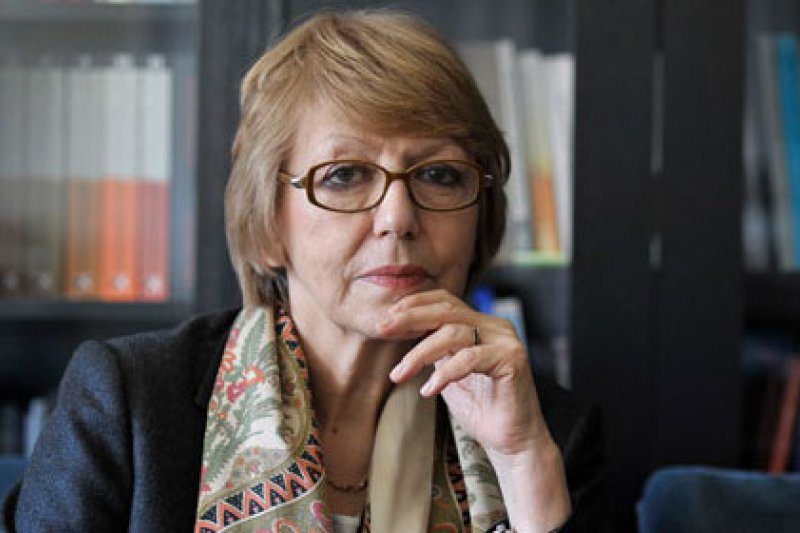An Accord Would Close Down the Balkan Issue
An in- depth analysis of the dynamic engagement of the US diplomacy jointly with the EU in the effort to resolve the longstanding conflict between Serbia and Kosovo was made by the President of the Helsinki Committee for Human Rights in Serbia, Sonja Biserko in an exclusive interview with Albanian Daily News.
“I would say that this is a specific, maybe a historic moment when the West is resolute in closing down the Balkan issue. It is momentum that neither Kosova nor Serbia should miss,” said Mrs. Biserko, a seasoned political researcher and analyst of Balkan affairs whose dream is to see ‘the plural Balkans within a plural Europe’.
“It is a really big challenge. It also implies the enormous responsibility of regional elites and societies, and requires critical and creative reflection and action, in the region and in Europe. This is my dream. I love Balkans,” said President of the Helsinki Committee for Human Rights in Serbia, Sonja Biserko in the following interview:
Albanian Daily News: The serious escalation of the conflict between Serbia and Kosovo at the end of the last year threatening to lead to armed confrontation was followed by a dynamic diplomatic offensive of the US jointly with the EU in early 2023 which prevented the worst. Please could you share with ADN’s readers Mrs. President your opinion on what has prompted Washington to step up its diplomatic involvement in the conflict between Belgrade and Pristina, which was the domain of the EU for more than a decade producing no results?
President of HCHR in Serbia Sonja Biserko: Ukraine war has profoundly affected the European security framework thus prompting the US response and comeback to the Balkans to finalize “unfinished business”: first, to stop tensions in the North of Kosova which Serbia systematically incited hoping that Prishtina will be challenged to respond by using the force. Secondly, by supporting the European proposal as a framework for the normalization of relations between Serbia and Kosova. Ukraine war created a new chance for the Balkans because of its security dimension. It is obvious that the US has a leading role in this diplomatic operation because it has always been perceived in the region as the only factor (like it or not) which is bringing solutions.
- Mrs. Biserko, Kosovo has accepted the latest Franco- German formula after the tough pressure, somewhat undiplomatic, by the US on PM Albin Kurti. Serbia's President Aleksandar Vucic has done the same amidst a tense domestic situation. What will happen next is the question that comes naturally after the failure of many accords mediated by the EU between Pristina and Belgrade which have been archived?
- I would say that this is a specific, maybe a historic moment when the West is resolute in closing down the Balkan issue. It is momentum that neither Kosova nor Serbia should miss. Russian role should also be kept in mind. Russian ambassador in Belgrade believes that Kosovo issue should be postponed until the war in Ukraine is finished. Obviously, he has in mind some kind of trade once the war in Ukraine is over. I don't think it's possible, or at least I hope so. Russia's criminal campaign against Ukraine has gone too far and the way things are now Ukrainians would not agree to agree to it. This is also one of the reasons that the West is pushing both sides to sign the proposal on the table by the end of March. That would be great relief for the whole region and would mark the reset point for the Western Balkans and the substantial opening of the EU perspective and the consolidation of the region. For Serbia it would mean giving up the idea of the Serbian world and first step for modernizing the country. As long as the aspirations of unification are on the table, Serbia cannot democratize.
- In the meantime, how do you see the position of PM Kurti in Kosovo and might his adversaries succeed in undermining his power as the issue of the Association of Serb Municipalities remains the hard nut to crack?
- Kurti has a big front against himself in Kosovo which is obstructing reforms he has promised but he still enjoys great support. Also, in Belgrade. He is systematically demonized in our media and there was hope that he would reject the proposal. Everybody was betting on that. He symbolizes a new generation of politicians to come with, I would say, “clean hands” which is great advantage having in mind the level of corruption in our region. His arguments about Association of Serb Municipalities (SZO) are valid because of fear that Belgrade would push for the status of Republika Srpska. West is also aware that it would affect functionality of Kosova. Kurti will have to make some compromises if he wants to stay in the game. But he can still negotiate to minimize the ethnic principle which is the major obstruction for consolidation of the region. Dayton Agreement is the template everybody refers to. It should have been limited to five or ten years but, unfortunately, Belgrade is now sticking to it as the ultimate reference. Instead, the concept of non-territorial minority autonomy should be discussed. It has in the meantime, gained renewed attention, as potentially effective way to decouple ethnicity and territory. It would address the need of minorities for internal self-determination, and, at the same time, preserve the territorial integrity and sovereignty of Kosova.
- Do you think that President Aleksandar Vucic is really interested in the resolution of the conflict with Kosovo and how will he survive in such an undertaking in face of extremist nationalist forces that do not give up seeing Kosovo as part of Serbia?
- Vucic is, it seems, already preparing ground for this breakthrough. His media outlets are slowly starting to bring up arguments for such a decision. The extreme nationalist is not a problem, I mean those in the Parliament, unless Moscow is pushing the rejection. The Serbian Orthodox Church is still quiet though it is against giving up Kosovo. However, Vucic might have the support of the Patriarch Porfirije. We will see. Objectively, Serbia would be looser and himself as well. It would greatly affect the economy and financial support Serbia gets from the EU. He gave an interesting explanation in yesterday’s interview for one TV by saying that Serbia must manage its "economic interests, which are in the west, but also about cultural issues, which are also in the east". To me it seems that he has opted for the economy after all.
- Do you think that official Tirana whose relations with Belgrade are good could play a more active role to exercise its influence on an improvement of the relations between Pristina and Belgrade?
- At one stage Tirana was closely engaged on the partition deal. It could play a more active role because I see this as unique opportunity for the breakthrough.
- Besides the pressure on the solution of the conflict with Kosovo, Vucic is pressed regarding the sanctions on Russia. Do you think that there would be a shift of Belgrade’s position vis-à-vis Russia and if yes which can be the reaction of Moscow which would lose its last stronghold in the WB in such an eventual case?
- Both Vucic and Dacic have announced that Serbia is considering sanctions on Russia. And there is enormous pressure on Serbia to align with the EU foreign policy from the European Parliament, Council of Ministers and the US. They mean it seriously. So far Russian ambassador said that have understanding for Serbia being under harsh pressure of the West. But he also said that Kosovo issue should be postponed for later stage. My personal feeling or to better express myself hope is that Vucic will finally choose the future for Serbia.
-To conclude, Mrs. President your rich experience as seasoned analyst gives me the opportunity to ask you if you would have thought of such a tense situation in the Western Balkans after the fall of communism in the 1990s, and secondly which are your expectations for the future of this region as part of Europe?
- The Balkans, that is, Southeastern Europe, is one of the most complex regions in Europe, and, at the same time, it is on its periphery. Throughout history, the conflicting interests of the great powers - Russia, the Austro-Hungarian and Turkish empires, the Soviet Union and the United States of America - have clashed in the Balkans.
That rivalry definitely marked the political and cultural structure of the region, but also significantly influenced its divisions, as well as the dynamics of relations between different peoples and ethnic communities.
The political elites of the former Yugoslavia missed a historical chance and, above all, they proved to be incapable of taking advantage of what was good in the legacy of the former Yugoslavia. In such a situation, the liberal potentials of Yugoslav socialism and the advantages of the unique international position that the country enjoyed for 50 years were not a strong enough basis for the democratic modernization and peaceful transformation of this complex country.
Serbia, metaphorically speaking, built its own wall before the fall of the Berlin Wall. Serbia was the only communist country in Europe that wanted to achieve its own goals in the post-Tito period through war. She thereby made it impossible for the peaceful dissolution of the Yugoslav federation. Unfortunately, the concept of the country's independence is inextricably linked to the national question. According to the Serbian political elite, the national question is much more important than democracy and freedom which is reduced to anti-communism.
Now, from this perspective, the expectations that with the fall of communism, democracy would inevitably and immediately flourish in the Balkans were unfounded. It was necessary - and still is necessary - to approach with much more attention the specificities of the region, its dominant traditions and values, and the potential of each country for democratic transition and adoption of freedom.
Consequently, what the region needs at this specific time is a fundamental change in the value system by strengthening the existing institutions.
The ongoing American and EU diplomatic offensive might be a new benchmark for opening up the true EU perspective. The Agreement between Kosova and Serbia would be the end of Yugoslav dissolution that is providing new framework and perspectives because the national questions are finally behind us. It would open the space to solving other problems that stand in the way of regional security and its democratic consolidation.
The plural Balkans, within a plural Europe, is a really big challenge. It also implies the enormous responsibility of regional elites and societies, and requires critical and creative reflection and action, in the region and in Europe.
This is my dream. I love Balkans.














